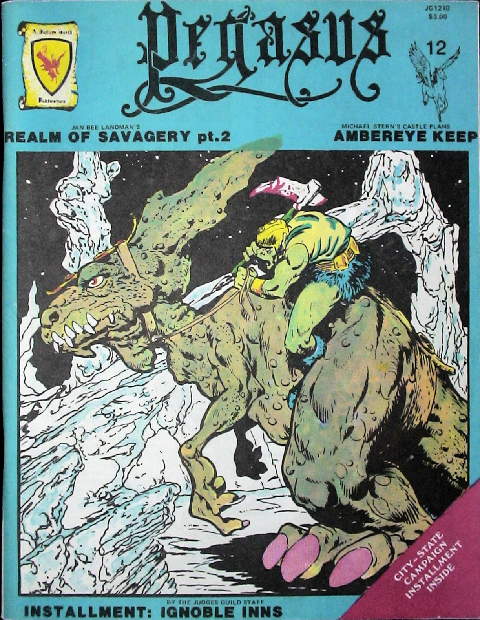Old school spell: Disbelieve Reality
This is part of what I love about the old-school ethos. I was browsing through Pegasus #12 today, looking for adventure ideas for what happens after the current adventure and before the player characters reach their destination, and I ran across this very old-school spell: Disbelieve Reality.
If the recipient misses his Save vs. Magic, the caster is able to convince him of the illusionary nature of any one real item. This will allow the victim to walk through walls, over pits, etc. Only one thing may be disbelieved. It must be a well-defined item but may be as complex as “the attacking army.” The spell lasts as long as the disbelieved item remains in visual contact.
Besides requiring that the target fail their saving roll for it to take effect, the target is required to make an Intelligence roll every round (which, remember, is a minute long in AD&D). If they roll lower than their intelligence on d20, they no longer disbelieve, and, like Wile E. Coyote, fall into the gorge. The smarter they are, the more likely they are to hold up that ACME sign.
Just as in real life, people find it easier to fool themselves than to fool others. The caster need only roll 1d10 (illusionists) or 1d12 (magic-users) less than or equal to their level to continue disbelieving reality. Since it’s a third level illusionist spell or a fifth level magic-user spell, that’s not going to be difficult.1
The spell requires speaking, motioning, and a material component. The material component is at least ten cubic feet of smoke or cloud. Poof! A big cloud of smoke, cast the spell, and reality is unreal.
Range is touch, and the casting time is one round.
Remember that in Gods & Monsters, you’ll have to estimate spell level by doubling the D&D level; it’s probably a seventh or eighth level spell. And since rounds are only ten seconds, I’d say that the Intelligence roll need only be made every minute. And the Reaction roll would be against Reason. They’ll need to fail a Reason roll in order to disbelieve reality.
I would probably make it a spirit manifestation instead. It’d be a good effect for Chaos and Trickster spirits. Call it Maya, Moksha, or Pierce the Veil, and give a true bonus to the roll of the target’s Wisdom as a major contributor. So that, while Intelligence hinders the character’s ability to achieve Moksha, Wisdom helps.
Illusionists get their first third level spell at fifth level; with a minimum intelligence of 15, rolling five or less on d10 is a much better chance than rolling 15 or higher on d20.
Magic-users get their first fifth level spell at ninth level; with a minimum intelligence of 9, rolling 9 or less on d12 is a much better chance than rolling 9 or higher on d20.
↑
- Maya at Wikipedia
- “Maya is the principal concept which manifests, perpetuates and governs the illusion and dream of duality in the phenomenal Universe.”
- Pegasus #12 at The Acaeum
- Ignoble Inns, The Tower of Babel, and all sorts of weird things from the early eighties gaming community.


Because, after all, the journey is the destination.